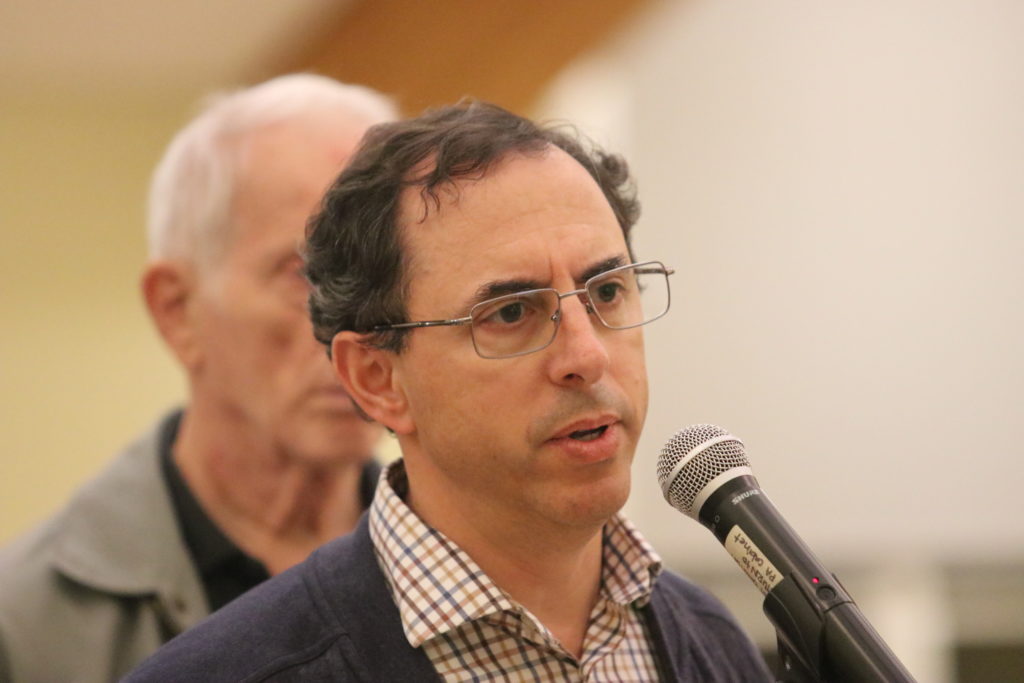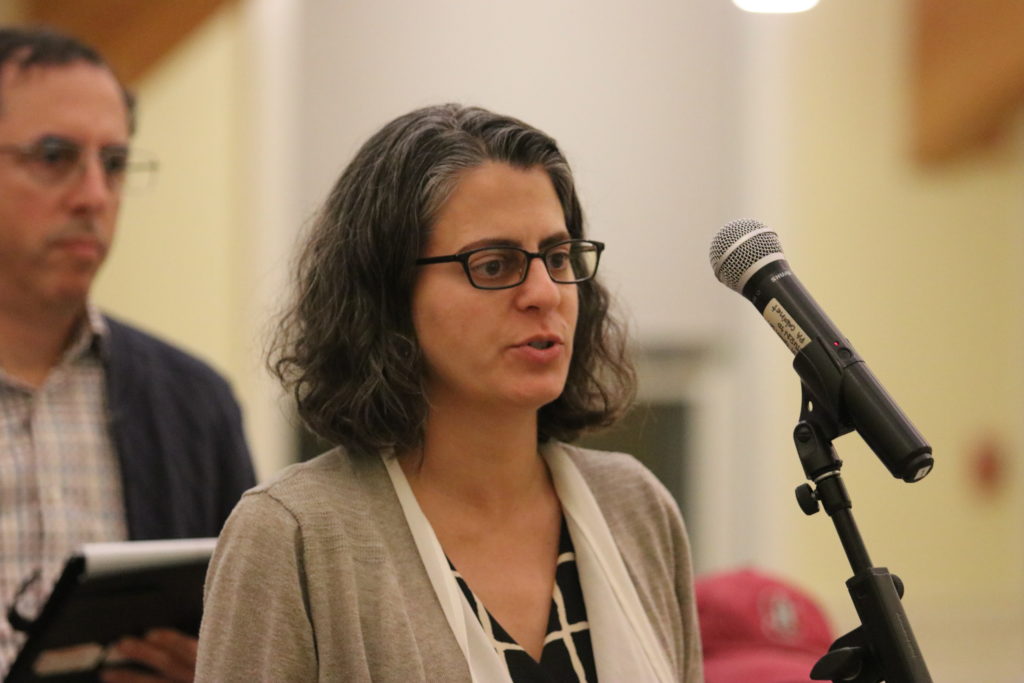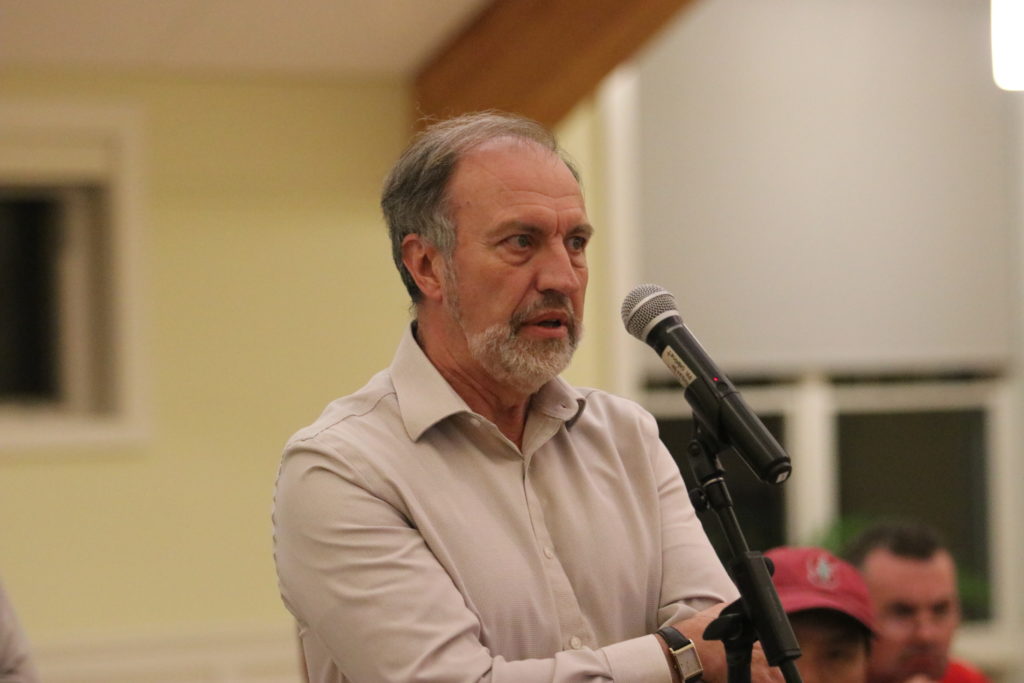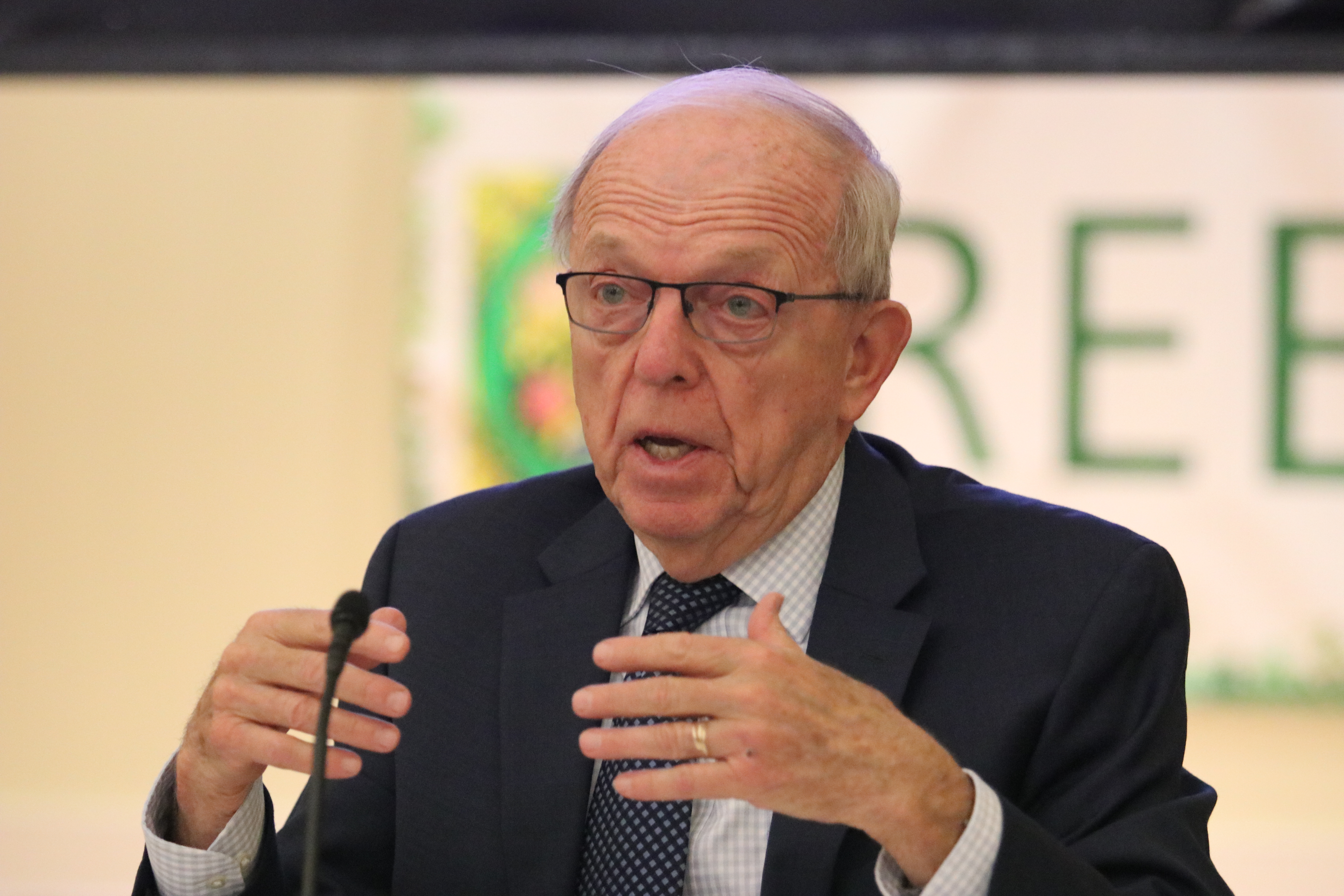Photo: Town Moderator Mike Widmer
If a recent public meeting is any indication of the feelings of both sides of the issue, Belmont Town Meeting Members would be advised to bring their pillows and mugs of coffee to the night in mid-November the Special Town Meeting takes up revising the roll call bylaw.
Not that the discussion on the three changes to the bylaw at the meeting held Tuesday, Oct. 15 at the Beech Street Center could be described as contentious – this is Belmont – but rather the depth of personal conviction by several members would lead many to forecast a long night of hearing countervailing arguments on a long list of amendments to the article.
“The idea [of bringing the article to Town Meeting] being to have a full democratic debate, reach whatever decisions that are the will of the Town Meeting and then put the issue behind us,” said Town Moderator Mike Widmer whose state goal was an attempt to make roll calls more efficient in its application.
There has been a universal push to “improve” the bylaw since the annual Town Meeting in May when requests for a roll call on several amendments were viewed as having alternative motives rather than the stated intent of increasing transparency of the town’s represented body.
The argument for and against greater use of the roll call option comes down to protecting members from “vote shaming” versus the right of the public to know how their representatives cast their votes.
The changes of the bylaw involve making certain votes automatic roll calls, the number of members needed to call a roll call and who can make a request for reconsideration.

Anthony Ferrante (Precinct 8) said unlike “real” politicians, Town Meeting members are “normal townspeople.” While he has sponsored unpopular amendments that were destined to “go down in flames,” that is not the case with the majority of the 290 members. “It’s hard to get up in public and vote the minority view,” he said.
Ferrante particularly points to call a roll call on an amendment or motion that passes with an overwhelming majority, referencing a vote on climate change at the annual Town Meeting earlier in the year when the votes against the measure were reduced from the aggregate vote and the roll call.
“The only reason to call for a roll call is to shame the few people who don’t” vote with the “right” side,” said Ferrante. “I want those people to be able to vote their conscience and if they don’t want to admit they are doing it, great. They are representing the minority view in this community.”
“I’d rather know that they’re out there than have people keep quiet,” said Ferrante.

Jill Clark (Precinct 7) countered Ferrante, noting “I’m concerned that we’re missing a fundamental principle of a representative democracy which is transparency.”
Saying that residents deserve to know how each member voted on amendments, Clark said, and can deny them re-election if they vote against their interest “[a]nd they can’t do that if they don’t know how they voted.” She contends with electronic voting, results are quick and easy – there are no “time sucks” as there were before e-voting so all votes should be roll calls.
“I fail to see the abuse,” said Clark going to Ferrante’s argument, “I’m really concerned about throwing around the word ‘bullying.’ Bullying implies a differential in power that does not exist between equally represented officials.”
“When I look at the counter arguments to me, none of them stack up against the need to have transparency,” said Clark.
Other participants spoke on procedural themes such as Jack Weis (Precinct 2) who said rather than take a second vote on a close decision – a measure passing by 10 or fewer – just use the technology available with electronic voting to reveal how members voted initially.
“It just seems to me that people shouldn’t be able to change their vote based on whether or not that will be recorded as to how they vote,” said Weis.
Surprisingly, it was two Town Meeting members with extensive backgrounds in IT who expressed the most apprehension of roll calls, not only the possibility for its more frequent use but also the technology that allows it to occur.

“I have to say that I think electronic voting was a huge step backwards,” said John Robotham (Precinct 2) as the technology is pushing Town Meeting to “enshire” all votes a roll call.
Robotham said before electronic voting, Town Meeting was more of a deliberative body and not simply a legislative one, where you could “actually learn stuff” about a measure from other members. He hopes at the Special Town Meeting there will be an effort to “walk back” the reliance on electronic voting.
Kevin Cunningham (Precinct 4) made a passionate case against the use of electronic voting as it foregoes “the sociology of Town Meeting.”
Before electronic voting, the focus of Town Meeting was on “the topic of discussion” and the rules were written to lead the town’s legislative body towards a consensus, said Cunningham. What the electronic roll call vote has introduced to the meeting is the politicization of how members voted.
“It’s all about partisanship and I’m just totally anti partisan. I can’t stand the partisanship that’s going on in the country, and I don’t like it happening in Belmont and I see it happening [here],” he said.
Cunningham said there are nuisances to casting a vote; “you could be voting ‘yes’ because you positively meant that or because you didn’t want this other consequences.”
“But people are ready to take your vote and say, ‘You voted for that and look we have the record.’ ‘And now let’s target that person,’ not ‘let’s argue the topic,'” said Cunningham. Roll calls have now personalize voting as opposed to focusing on on the truth thing which is what’s best for Belmont, he said.








I really don’t understand why this is controversial. You’re elected. You vote on things. People have a right to know how their elected officials vote. It doesn’t matter if it’s a small town or a Congressional hearing. Also, if you’re a person who changes your vote when there’s a name on it, maybe it’s time to rethink your role as a Town Meeting member. This isn’t a popularity contest. You should have the strength of your conviction at all times, not just when anonymity is provided.
Also, I work in technology as well, and the correlation between electronic voting and partisanship made above is one I’m not getting. Partisanship doesn’t just mean political party affiliation; it’s a bias or preference towards something. We’re all partisan because we have opinions. Voting is inherently partisan. You have to vote one way or another. Town Meeting provides plenty of opportunity for people to step up to the mic and talk about the nuances of an issue and voice their concerns and give context to the way they’re ultimately going to vote, but in the end voting is binary: it’s yes or no. Maybe people would love to be able to sit everyone down and explain exactly why they voted a certain way, but we don’t have that luxury and you have to be okay with that or, again, rethink your position as a voting member of an organization.